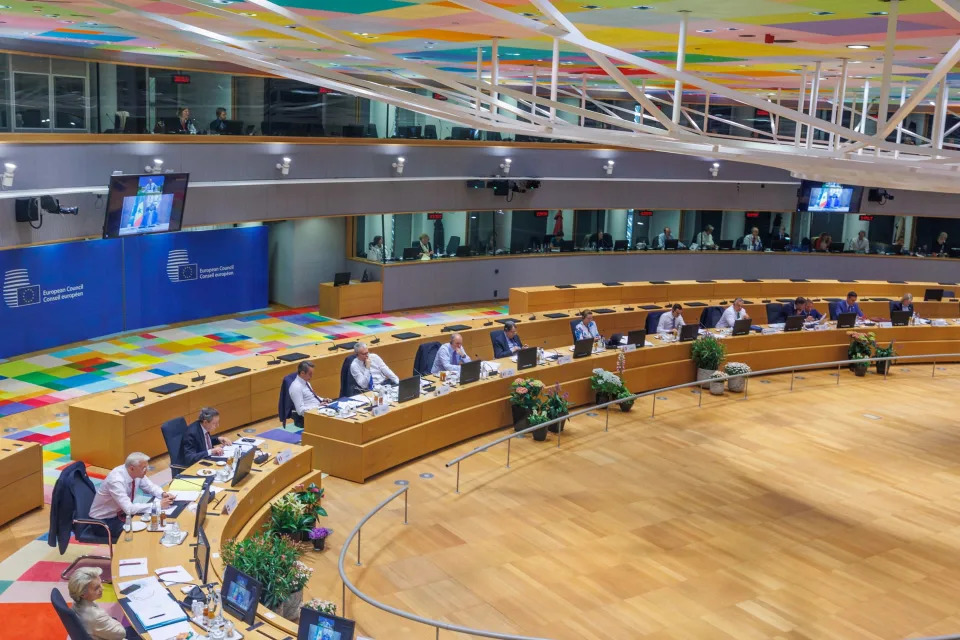The fighting continues in Severodonetsk, where the pro-Russians say they already control a third of the city, while European leaders debate how to advance in the disconnection of energy from Russia.
The militias of the self-proclaimed people’s republic of Lugansk, in eastern Ukraine, with the support of the Russian Army, control a third of Severodonetsk, the last important city in that region held by Ukrainian troops, its leader, Leonid Paséchnik, assured today.
“It can already be said that we control a third of the city,” Pásechnik told the official Russian agency TASS when commenting on the situation in Severodonetsk, the scene of fierce fighting in recent days.
He admitted that the offensive is not advancing as fast as he would like, a circumstance that he explained with the desire to preserve as much of the city’s infrastructure as possible.
“Our main task is to liberate Severodonetsk and Lisichansk. In these sectors, according to the military, the grouping of Ukrainian troops is made up of about 10,000 troops,” Pasechnik said.
UKRAINIAN FEAR IN SEVERODONETSK
The Russian military plans to carry out a “cleansing operation” in and around Severodonetsk, in the eastern Lugansk region, to eliminate or neutralize any enemies in that area that it is about to fully control.
Serhii Haidai, head of the Lugansk regional military administration, explained on Tuesday that the situation in this city, the second most important that the Russians still do not fully control in the Lugansk region, “is extremely difficult.”
“On the morning of May 31 it became known that the Russian invaders plan to carry out a mopping-up operation around Severodonetsk, in the Luhansk region,” the military official wrote on social media, according to local Ukrainian agencies.
The Russian Army “has deployed a battalion of soldiers there, who will comb the villages on the outskirts of Severodonetsk, they are gathering their equipment,” he said.
The Russians “are sending a battalion of soldiers who will go through the surrounding villages. They are moving teams with large flamethrowers to simply burn our army, along with the civilian population, they don’t care,” Haidai said.
THE EU DEBATES ENERGY AND DEFENSE
Meanwhile, European Union leaders are discussing on Tuesday how to ease the food crisis from the war in Ukraine, as well as how to strengthen European defense and how to continue the disconnection of Russian energy.
After giving the green light last night to a sixth round of sanctions on Russia, including most of the oil, the 27 will continue their talks on energy, which they left unfinished yesterday, about ways to eliminate dependence on the EU to Russian fossil fuels as soon as possible.
The ban on the veto on Russian energy was already opened with coal in the fifth package of sanctions and now continues with the end of imports of 90% of Russian oil before the end of the year in a political agreement reached at this summit, which introduces a temporary exception for crude oil arriving in Hungary, the Czech Republic and Slovakia by pipeline.
In addition, Russia’s war in Ukraine, which will be a hundred days old this Friday, has highlighted the need for a “stronger and more capable EU in the field of security and defense”, according to the draft conclusions.
The 27 will also discuss food security, including international coordination and how to guarantee a comprehensive global approach that allows circumventing or mitigating the effect that the Russian blockade of the Black Sea ports is causing, which prevents Ukraine from exporting its cereals to the rest of the world.
PORT ACTIVITY IN MARIÚPOL
A ship left the port of Mariupol, in southeastern Ukraine and under Russian control, today with 2,500 tons of rolled steel coils bound for the Russian region of Rostov, the first to do so since Russian forces recently seized the ukrainian city.
“Today 2,500 tons of hot-rolled steel coils left the port of Mariupol, the ship is headed for Rostov,” Denis Pushilin, leader of the self-proclaimed Donetsk People’s Republic, wrote.
Ukraine has called Russia’s shipment of Ukrainian metal to that country looting.
Pushilin stressed that this transport hub “is very important” for Donbas, the region to which Mariupol belongs, since it is the largest port in the Inner Sea of Azov and is the only one where all kinds of cargo can be handled, including in winter.

